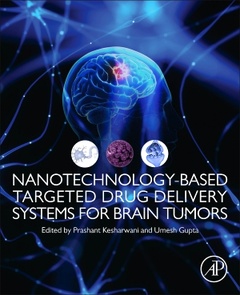Description
Nanotechnology-Based Targeted Drug Delivery Systems for Brain Tumors
Coordinators: Kesharwani Prashant, Gupta Umesh
Language: English
Subjects for Nanotechnology-Based Targeted Drug Delivery Systems for...:
Keywords
Active targeting; Adsorptive-mediated endocytosis; Angiogenesis; Angiogenic inhibitors; Angiogenic switch; Biodistribution; Blood-brain barrier; Blood-brain barrier (BBB); Brain targeting; Brain tumor; Brain tumor treatment; Brain tumors; CNS; CNS anatomy; CNS tumor classification; CNS tumors; CNTs; Carrier-mediated endocytosis; Central nervous system (CNS); Chemokines; Chemotherapy; Dendrimer; Dendrimers; Diagnostic imaging; Drug conjugates; Drug delivery; Drug targeting; Dual-targeted; Endothelial cells; Evaluation; Experimental models; Functionalization; Gene delivery; Glioblastoma; Glioblastoma multiforme; Glioma; Glioma microenvironment; Imaging; Liposomes; Macrophages; Malignant glioma; Malignant tumor; Manufacture; Microglia; Nanocarriers; Nanodevices; Nanoemulsion; Nanomedicine nanotechnology; Nanomedicines; Nanoparticles; Nanotechnology; Nasal delivery; Neurodegeneration; Neuroinflammation; Nucleic acid-based nanomedicines; Passive diffusion; Passive targeting; Peptide-based nanomedicines; Physiology; Polymeric micelles; Polymeric nanoparticles; Polysaccharides; Proteins; Receptor-mediated endocytosis; Safety; Solid lipid nanoparticles (SLNs); Spine tumors; Stimuli-responsive; Targeted delivery; Toxicity; VEGF
478 p. · 19x23.3 cm · Paperback
Description
/li>Contents
/li>Readership
/li>Biography
/li>Comment
/li>
Nanotechnology-Based Targeted Drug Delivery Systems for Brain Tumors addresses brain anatomy and tumors and the progress and challenges in delivering drugs across the blood brain barrier. Several chapters are devoted to the latest technologies and advances in nanotechnology, along with practical solutions on how to design more effective nanocarriers for drug and gene delivery. This valuable resource prepares readers to develop novel drug delivery systems for the treatment of brain tumors that further promote the latest nanomedical technologies.
Pharmaceutical industry scientists, graduate students and academic researchers in pharmaceutical science and materials science working in drug delivery and nanotechnology, clinical researchers including neuroscientists and cancer researchers
Dr. Prashant Kesharwani is working as an assistant professor of pharmaceutics at the School of Pharmaceutical Education and Research, Jamia Hamdard University, New Delhi, India. He has more than 12 years of teaching, research, and industrial experience at international levels from various countries, including the United States, Malaysia, and India. An overarching goal of his current research is the development of nanoengineered drug delivery systems for various diseases. He has more than 300 international publications in well-reputed journals and more than 20 international books (Elsevier). He is a recipient of many research grants from various funding bodies. He is also a receipt of several internationally acclaimed awards such as the most prestigious “Ramanujan Fellowship Award from the Science and Engineering Research Board, Government of India. He actively participates in outreach and scientific dissemination for the service of the wider community.
Dr. Umesh Gupta, currently working as Assistant Professor at Department of Pharmacy, Central University of Rajasthan, India, did his bachelor's, master's and doctorate degree in Pharmaceutical Sciences from Dr. H. S. Gour University, India under the mentorship of Prof. NK Jain. He has recently been awarded for “DAAD Research Stays for Academics and Scientists at Leibniz-institut fur Polymerforschung Dresden, Germany. He has the past experience of Research Scientist at Ranbaxy Research Laboratories, India and Post-Doctoral Research Associate at South Dakota State University, USA. HE is also recipient of Young Scientist Award by Department of Science and Technology, Government of India as well as Ranbaxy Science Scholar Award 2008 by Ranbaxy Research Laboratories, India. He has been awarded more than 3-4 times the overseas travel award by different funding agencies of Indian government to share and present his research at international platform in countries like Germany, USA and Singapore etc. He has more
- Addresses the progress and challenges inherent in delivering drugs across the blood brain barrier and offers strategies to maximize effectiveness
- Draws upon the experience and expertise of international scientists working in the fields of drug delivery and nanomedicine
- Considers the future possibilities of nanotechnology for delivering nanocarriers that better diagnose and treat brain tumors




